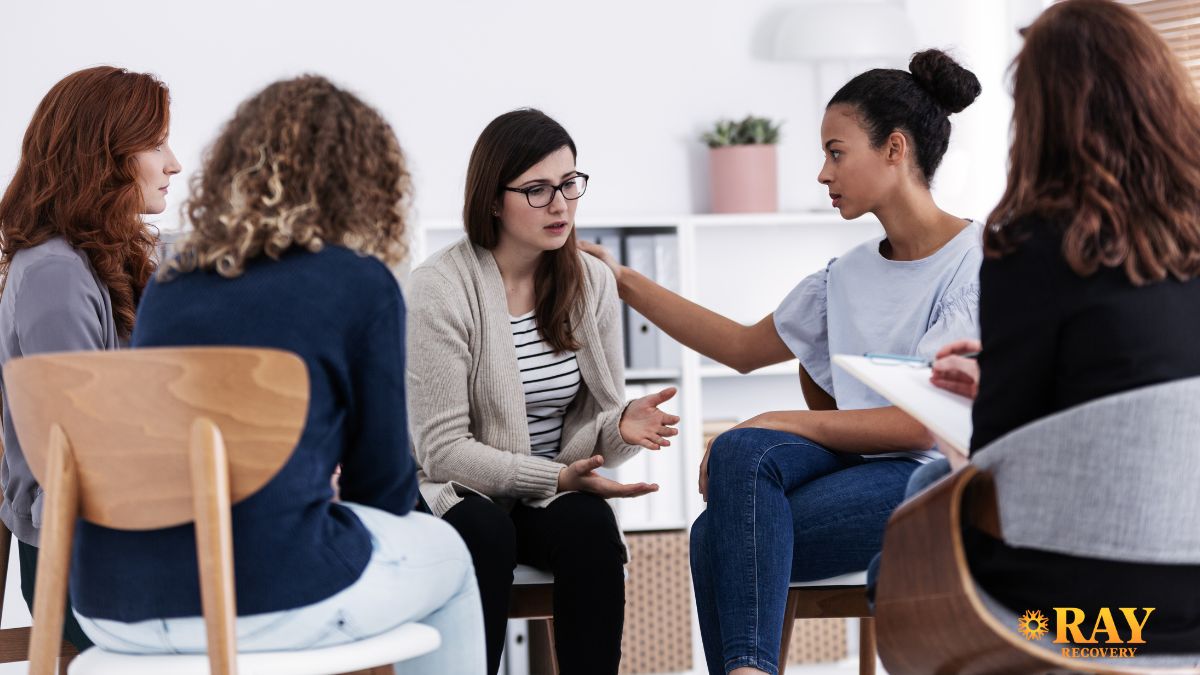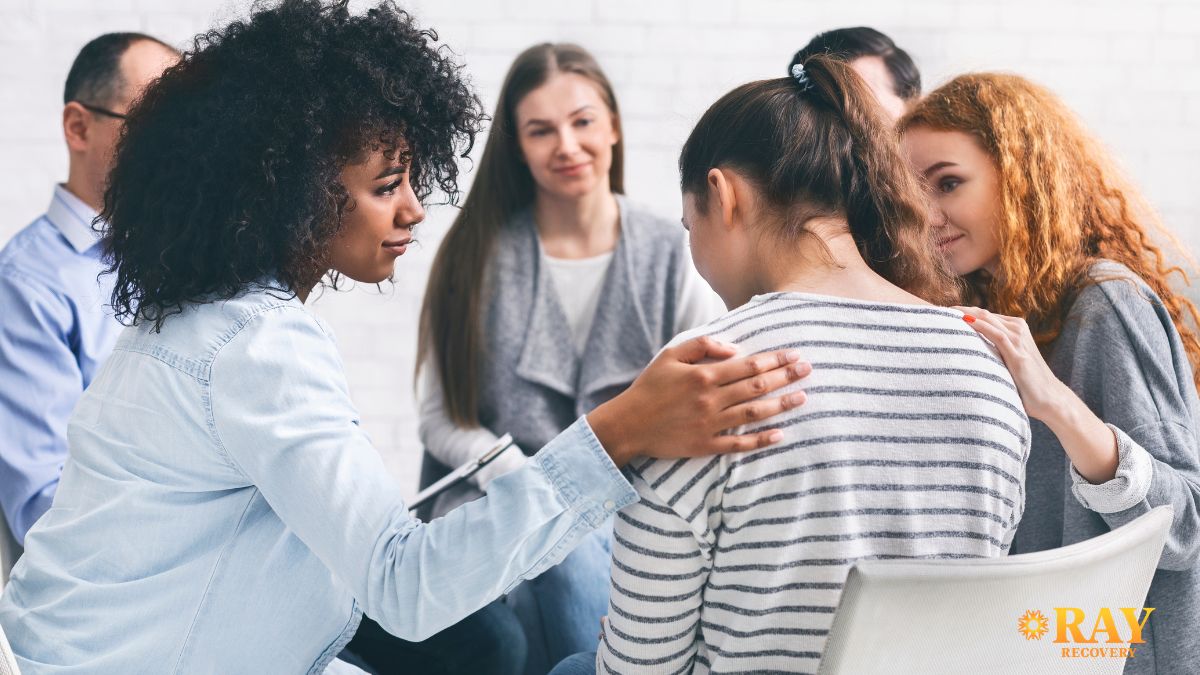Key Points:
- Group therapy provides a safe, structured environment for individuals to share experiences, build trust, and reduce feelings of isolation in addiction recovery.
- It strengthens relapse prevention by teaching coping strategies, accountability, and support from peers facing similar struggles.
- Combining group therapies with family support, holistic rehab, and mental health counseling creates a stronger foundation for long-term sobriety.
Recovery from addiction is not something most people can achieve alone. Even the strongest individuals often find themselves needing encouragement, guidance, and accountability along the way. One of the most effective tools in this process is group therapy.
Group therapy creates a space where people can share openly with others who understand the challenges of substance use. Unlike individual therapy, it offers a sense of belonging and community that can be powerful in healing. Whether part of structured addiction treatment programs or ongoing support groups, the role of group therapy in recovery cannot be overstated.
This article will explore how group therapy supports recovery, why it is so effective, and how it fits within a broader treatment plan that may also include relapse prevention, family support, holistic rehab, and mental health counseling.

Why Group Therapy Matters in Recovery
Group therapy works because it meets one of the most basic human needs: connection. Addiction thrives in isolation, and many people struggling with it feel misunderstood, judged, or alienated. Being part of a group allows individuals to see they are not alone.
In these sessions, members share personal stories, express struggles, and listen to others facing similar challenges. This exchange builds trust and normalizes experiences that often carry shame. Over time, group therapy becomes a place of empowerment.
It’s also practical. People in recovery gain insights from each other that they might never discover alone. Group discussions reveal new coping strategies, ways to avoid triggers, and real-world perspectives on staying sober.
Benefits of group therapy in addiction recovery include:
- Shared experience – Reduces feelings of isolation by connecting with others who understand.
- Accountability – Encourages members to stay committed by checking in regularly.
- Skill-building – Offers tools for stress management, emotional regulation, and communication.
- Hope and inspiration – Hearing stories of progress motivates others to keep going.
- Safe environment – Provides a nonjudgmental space for honesty and growth.
These benefits make group therapies a cornerstone of effective addiction treatment programs.
The Role of Group Therapy in Relapse Prevention
One of the greatest fears in recovery is relapse. Addiction is a chronic condition, and relapse is often part of the journey. But group therapy can significantly reduce its likelihood by teaching members how to anticipate, recognize, and manage triggers.
In a group setting, people discuss cravings, stressful situations, and setbacks. Instead of bottling these struggles, they learn how to address them head-on. This collective problem-solving helps members strengthen their personal relapse prevention strategies.
For example, someone might share how they handle stress at work without turning to alcohol. Another may describe avoiding old social circles that once encouraged substance use. These real-life examples provide inspiration and practical steps that others can apply.
Key ways group therapy supports relapse prevention:
- Encourages open discussion about cravings before they become overwhelming.
- Builds accountability by setting goals and following up with group members.
- Teaches strategies like mindfulness, healthy routines, and emotional awareness.
- Provides encouragement when setbacks occur, reducing the risk of giving up entirely.
By focusing on relapse prevention, group therapy helps transform recovery from a fragile state into a sustainable lifestyle.

Types of Group Therapies in Addiction Recovery
Not all group therapies are the same. Different formats serve different purposes, and many treatment programs include a mix to address various needs. Understanding these formats helps individuals and families know what to expect.
Some common types include:
- Psychoeducational Groups – Focus on teaching about addiction, coping strategies, and the science of recovery.
- Skill Development Groups – Help members build practical skills like stress management, communication, and emotional regulation.
- Support Groups – Centered around sharing experiences, offering encouragement, and building accountability.
- Cognitive-Behavioral Groups – Work on changing thought patterns and behaviors that contribute to substance use.
- Relapse Prevention Groups – Specifically designed to identify high-risk situations and create personalized action plans.
- Holistic Rehab Groups – Incorporate mindfulness, meditation, yoga, or other whole-person practices to support mental and physical well-being.
Each type contributes differently to the healing process. A balanced treatment plan often includes a combination of these groups, ensuring that recovery addresses emotional, mental, and physical aspects of addiction.
How Family Support Enhances Group Therapy
While group therapy focuses on peer-to-peer healing, family support plays an equally vital role in addiction recovery. Addiction affects not just the individual but also those closest to them. When family members join therapy or participate in support groups, the entire household can begin to heal.
Families often carry resentment, confusion, or enabling behaviors without realizing it. Group therapy sessions that include families allow open discussion about these dynamics. Loved ones learn how to set boundaries, offer healthy support, and avoid unintentionally feeding old patterns.
When families engage in the process, it reduces isolation for the person in recovery and provides a stronger foundation for long-term sobriety. Combining family support with peer group therapies creates a dual network of accountability and encouragement.
The Connection Between Group Therapy and Mental Health Counseling
Addiction rarely exists in isolation from mental health issues. Many people in recovery also deal with anxiety, depression, or trauma. Group therapy often works hand in hand with mental health counseling to address these underlying conditions.
For example, someone with unresolved trauma may struggle to stay sober without targeted therapy. Group sessions offer a place to share, while individual counseling digs deeper into personal triggers. This combination ensures that both the addiction and the root causes are treated.
When integrated properly, mental health counseling and group therapy create a complete support system. One builds self-awareness on a personal level, and the other reinforces resilience within a community.

Tips for Making the Most of Group Therapy
Joining a group for the first time can feel intimidating. Many people worry about being judged or about opening up to strangers. But with time and the right approach, group therapy becomes a powerful tool in recovery.
Here are some tips for getting the most out of the experience:
- Be consistent – Attend sessions regularly to build trust and momentum.
- Stay open-minded – Listen actively, even when others’ stories differ from your own.
- Set personal goals – Use the group as accountability for specific milestones in your recovery.
- Practice honesty – The more authentic you are, the more value you’ll get from the process.
- Seek feedback – Allow others’ perspectives to help you grow and stay motivated.
By embracing group therapy fully, individuals can gain not only tools for sobriety but also friendships and support systems that last long after formal treatment ends.
Embrace Group Therapy as a Cornerstone of Recovery
Addiction recovery is a lifelong journey, but it doesn’t have to be walked alone. Group therapy provides structure, belonging, and tools that make lasting sobriety possible. By combining it with relapse prevention strategies, holistic rehab approaches, family support, and mental health counseling, individuals can build a recovery plan that addresses the whole person.
Take the Next Step Toward Recovery
If you or someone you care about is struggling with addiction, you don’t have to face it alone. Ray Recovery offers compassionate drug addiction treatment in Ohio that includes group therapies, relapse prevention strategies, and holistic rehab options. With expert guidance and a supportive community, you’ll find the encouragement and tools needed to rebuild your life.
Reach out today and begin your path to healing with a program designed to support both immediate recovery and long-term growth.


